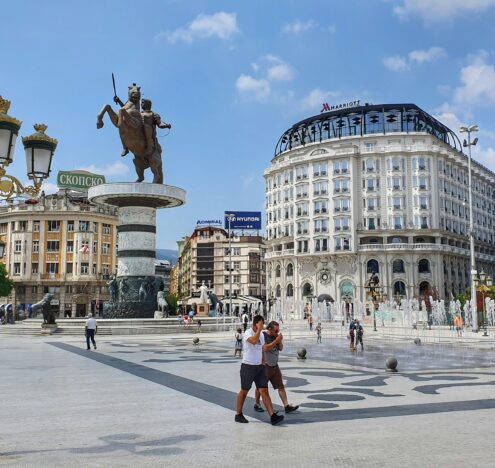This analysis was featured in Critical State, a weekly newsletter from Inkstick Media and The World. Subscribe here.
In 1999, northern states within Nigeria adopted “full sharia,” or Islamic religious law, an action possibly made to deliberately delineate the country’s Muslim north from its Christian south. Every law can be open to interpretation in ruling, execution, and standards for evidence, and the sharia adopted is not different. Where there is a dispute over interpretation, there is a discourse, and while dominant traditions and legal schools largely held sway, the debate created room for alternate expressions of religious reasoning.
In “Northern Nigerian intellectuals, Sudan, and the ‘eclectic style’ in contemporary Islamic thought,” Alexander Thurston examines a pair of thinkers actively involved and engaged in this discourse.
“Eclecticists cross or blur boundaries between sectarian camps, even as they may have their own enemies and rivals,” writes Thurston. “Within politics, eclecticism carries advantages and disadvantages for its bearers, sometimes facilitating their access to non-Muslim institutions and forums, but simultaneously exposing eclecticists to charges of heterodoxy and inauthenticity.”
Intellectual debate over the nature and implementation of religious law is alive and well, and capable of accommodating more perspectives than just the narrow tenets of long-established schools.
While doctrinaire intellectuals abound, firmly adhering to their respective schools of thought, the experience of intellectual debate, practice, and implementation can’t be contained in a single school. Thurston notes that, while the Sunni and Shi’a divisions in Islam persist, increasingly, Muslims across the world identify as “just Muslim,” a category that includes over one-fifth of Muslims in Sub-Saharan Africa.
The presence of this laity, of believers in faith broadly rather than expressly tied to a specific school of thought or doctrinal tradition, can create room for eclecticists. In his article, Thurston focuses on two specific eclectic thinkers: Aminu Ismaʿil Sagagi and Sanusi Lamido Sanusi, both from Kano, Nigeria, who attended Sudan’s International University of Africa in the mid-1990s, and who have public writings on the role of sharia in northern Nigeria.
Like Islamists, with whose thoughts both men are deeply familiar, these eclecticists ask how to create a just Islamic society by using the tools of the state and the law. Yet, “eclecticists deconstruct, rather than objectify, notions such as ‘sharia,’” writes Thurston. “The eclecticists’ emphasis on exploring political possibilities rather than championing established political programmes recalls the notion of ‘post-Islamism,’” which eludes to the frustration-driven search for an Islamic political framework beyond the horizons of the Muslim Brotherhood and its peers.
Some of this broader deconstruction can be attributed to the intellectual climate of the International University of Africa, which attracted students from a range of traditions and actively featured a curriculum drawing beyond just the set texts of any given school of Islamic jurisprudence. It meant an expansive engagement with Islamic intellectuals and writers like Georg Wilhelm Friedrich Hegel, Karl Marx, and Antonio Gramsci.
When considering Sanusi’s thinking, Thurston writes, “A central component of this framework is the idea that Islamic movements and institutions are historically conditioned rather than universally replicable.” Sanusi noted that, while sharia interpretations were expansive and progressive at the time they were first implemented, returning to the original implementation of the laws misses what was so powerful about them in the first place.
While neither of the scholars featured set out a dominant path in Islamic thought within Nigeria, both demonstrate that intellectual debate over the nature and implementation of religious law is alive and well, and capable of accommodating more perspectives than just the narrow tenets of long-established schools.




















